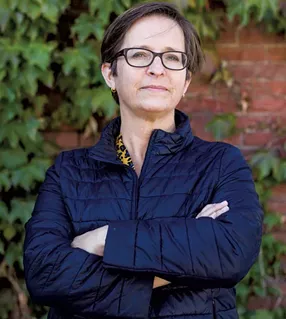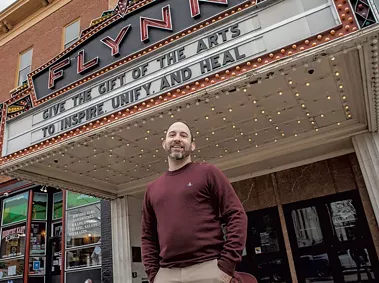Of all the emails the National Endowment for the Arts sent to theaters, symphonies and nonprofits across the country last Friday, one that arrived in Miranda Miller’s inbox at 4 p.m. was among those wreaking the greatest havoc.
The NEA wrote to cancel grants or to withdraw the “tentative funding recommendations” it had offered.
Miller’s Acorn Youth Arts nonprofit was counting on a $10,000 Challenge America grant, half of the money needed to run monthly writing workshops for Orange County teens starting in October. Miller has already lined up writing instructors, including former Vermont Poet Laureate Sydney Lea, former Maine Poet Laureate Baron Wormser, and Vermont reigning poetry slam champion, Geof Hewitt. The teens’ work is to be published in a literary magazine and the nine-month program is set to culminate with a series of public readings, the final one at the Vermont Statehouse.
Miller had planned to start recruiting students next week, she said in an email: “This has halted us in our tracks.”
At least three other Vermont arts organizations have also had their NEA grants cancelled or withdrawn. The news came one month after state humanities councils were notified that their awards had been terminated and hours after President Donald Trump proposed eliminating the NEA, the National Endowment for the Humanities and the Institute of Museum and Library Services. Trump’s attempts to close the NEA and NEH in his first term failed.
U.S. Rep. Becca Balint (D-Vt.) will host a “community conversation” about the challenges arts and humanities institutions are facing at 1 p.m. on Friday at Chandler Center for the Arts in Randolph.
DOGE Looks to Gut Vermont Humanities, Terminate Grants

DOGE Looks to Gut Vermont Humanities, Terminate Grants
By Ken Picard
Arts News
In the latest round of cuts, the Vermont Symphony Orchestra learned it will not receive $25,000 to support three of its concerts: Two were presented earlier this year and the third, the orchestra’s season finale, is this Saturday, May 10, at the Flynn in Burlington.
The Flynn has lost a $25,000 grant to support three dance performances, two of which have already been staged. Governor’s Institutes of Vermont was told it will not receive the $30,000 it was expecting to support its two-week summer arts institute, which already has 190 Vermont high school students enrolled, the most in the institute’s 42-year history.
Organizations have seven days to appeal.
In its May 2 email to arts groups informing them of their cancelled grants, the NEA outlined its new priorities under the Trump administration:
“The NEA is updating its grantmaking policy priorities to focus funding on projects that reflect the nation’s rich artistic heritage and creativity as prioritized by the President. Consequently, we are terminating awards that fall outside these new priorities. The NEA will now prioritize projects that elevate the Nation’s HBCUs [historically Black colleges and universities] and Hispanic Serving Institutions, celebrate the 250th anniversary of American independence, foster AI competency, empower houses of worship to serve communities, assist with disaster recovery, foster skilled trade jobs, make America healthy again, support the military and veterans, support Tribal communities, make the District of Columbia safe and beautiful, and support the economic development of Asian American communities.”
Vermont Symphony Orchestra executive director Elise Brunelle said the VSO satisfied the priorities the NEA specified at the time of their grant application, and the endowment’s action “really just boils down to reneging on a contract. … Going back on your word and on your contract is a very un-American thing to do.” She said plans to appeal.
Flynn executive director Jay Wahl acknowledged that $25,000 is a very small percentage of the theater’s $9 million annual budget, but the Flynn publicized the grant withdrawal on social media “to remind people that we’re in an unsteady time and the arts are on the chopping block,” Wahl said.
The uncertainty makes planning difficult, he continued. Although the Flynn receives very little federal funding, some of the projects it is considering for next year likely rely on NEA support.
“We run Poetry Out Loud, which is a national program run by the NEA,” he said. “So we don’t yet understand what the implications of all this are.”
In fiscal year 2024, the NEA awarded 19 grants totaling over $1.3 million to Vermont organizations. In addition to these direct grants, the NEA sends about $1 million annually to its Vermont partner agency, the Vermont Arts Council. That funding is mandated by Congress and has not been affected, executive director Susan Evans McClure said. “And in fact, last Thursday, the NEA’s National Council on the Arts, who approves their grant making, approved our FY 26 funding as well.”
NEA dollars account for 40 to 45 percent of the arts council’s annual budget. The state matches those dollars, and the balance of the council’s budget comes from private donors.
The council will award $1.5 million in grants this year to Vermont individuals and organizations. Many grant programs are open to applicants now, and McClure encouraged people to apply: “As much as anything is guaranteed in the moment we’re living in, we are moving forward with the assumption that that funding will be available for Vermonters.”
In East Corinth, Acorn Youth Arts offers free programs to rural Vermont youths in music, studio arts, literary arts, film and media production, and theater arts. The nonprofit will appeal the NEA’s decision, founder Miller said. If they lose, they will scramble to find alternate funding, or postpone this year’s writing workshops. The theme they’ve chosen: “The 250th Anniversary of America: Celebrating What Makes America GREAT!”


